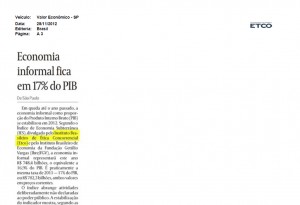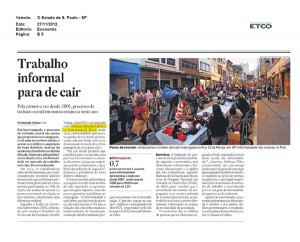ETCO encourages studies and supports campaigns to reduce the size of the shadow economy, which does not pay taxes, weakens labor relations and gets in the way of honest companies.
REFERENCES
- The Informal Economy in Rio de Janeiro: problem or solution, by Rodrigo Lopes. Editora Mauad, 1996.
The work is a detailed study on the informal economy in the city of Rio de Janeiro, addressing the theme with comparative tables and graphs, its social and economic causes, and presenting a suggestion for solving the problem of unemployment and improving working conditions. Informal. - Informal economy and law in Brazil, by Ney Prado. Editora LTR, 1991.
- Employment in the Informal Economy of Latin America, by Renato Duarte. Editora Massangana, 1984.
- Wealth and Misery at Work in Brazil, by Ricardo Antunes. Editora Boitempo, 2006.
The result of collective research by various sectors of the Brazilian economy, from classical to banking, from the automobile industry to the informal economy, this book provides an overview of the current moment and the future of work and unionism in Brazil. Ricardo Antunes and a group of researchers and authors, such as István Mészáros, Luciano Vasapollo, Márcio Pochmann and Giovanni Alves, study the impacts of changes in legislation; the new international and regional division of labor and capital, such as the impact of Chinese products and the move of manufacturing units to the interior of the country; and recent technological changes, such as the adoption of toyotism's administrative methods. - Brazilian Economy, by Manoel Luzardo de Almeida. Editora Ortiz, 1992.
The work deals with subjects such as the four cycles that make up the economic history of Brazil, economic and financial systems, evolution of the economic situation, export policy, presence of the State in the economy, taxation, import substitution process, demographic variable, labor market , government planning, inflation, macroeconomic policies, instituted informal economy and economy of Rio Grande do Sul. - Informal Economy, Appropriate Technology and Associations, by Diva Benevides Pinho. Editora Ipe Usp, 1986.
- Informal Economy Understand the Brazilian Economy With Informality, by Otoniel Pacheco Filho. Editora Blend Consultoria, 1995.






